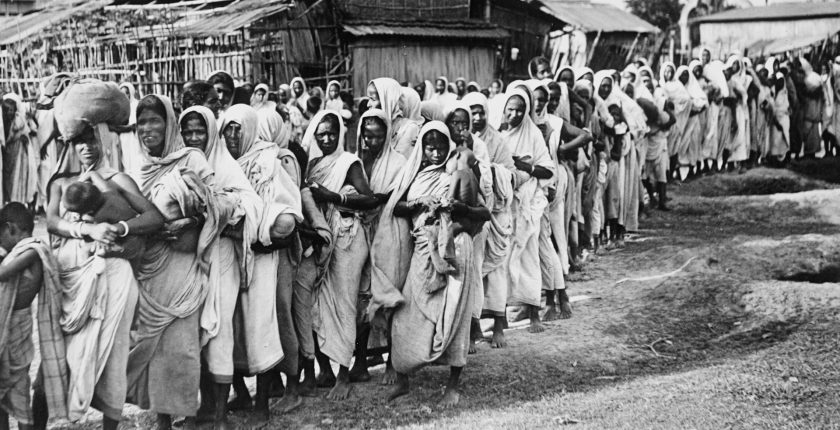
Indians Again: No Oscars for Movies about War Criminals
If some people have anything to say, Gary Oldman and Darkest Hour are ineligible for praise. “Oscars celebrate Winston Churchill,” writes Tom Blackwell in the Vancouver Sun. “Some wonder if he was more war criminal than war hero for starving Indians.”
No doubt some people also wonder if it rains up.
Fair and Balanced?
Mr. Blackwell makes a weak effort at balance, quoting Arthur Herman, eminent author of Gandhi and Churchill. “Absent Churchill,” Herman says, “Bengal’s Famine Would Have Been Worse.” He lists the true causes of the Bengal famine—which were many and varied—and Britain’s efforts to relieve the plight of Indians. These words deserve more ink than they get.
The rest of this piece mostly relies on a discredited 2010 book which failed to look at context and sources. And a historian who thinks perhaps that Churchill “didn’t prize the lives of people in Bengal very highly.” To vapid assertions not backed by fact, Churchill’s biographer Sir Martin Gilbert used to say, “Perhaps not!”
I was part of the editorial team on The Churchill Documents, Volume 19, Fateful Questions, September 1943 to April 1944 (2017). Numerous entries show that Churchill and the War Cabinet did their utmost to relieve suffering among Indians. This included shipping 350,000 tons of Australian wheat. They even offered Iraqi barley, but were frustrated to find that Indians wouldn’t eat it.
Documentary Evidence
The War Cabinet acted quickly on the danger to Indians. On 4 November 1943 Churchill acknowledged Prime Minister Mackenzie King’s offer of Canadian wheat. This, he said, would take “at least two months” to reach India. Instead he was relying on Australian wheat,w hich would take only “three to four weeks.”
In early 1944 the British Empire exhausted its sources of food relief. Churchill turned to President Roosevelt. Desperately he appealed for help (which FDR denied, saying America, too, had insufficient shipping). Churchill wrote:
I am seriously concerned about the food situation in India and its possible reactions on our joint operations. Last year we had a grievous famine in Bengal through which at least 700,000 people died….By cutting down military shipments and other means, I have been able to arrange for 350,000 tons of wheat to be shipped to India from Australia during the first nine months of 1944. This is the shortest haul. I cannot see how to do more.
We have had much hesitation in asking you to add to the great assistance you are giving us with shipping but a satisfactory situation in India is of such vital importance to the success of our joint plans against the Japanese that I am impelled to ask you to consider a special allocation of ships to carry wheat to India from Australia…. have resisted for some time the Viceroy’s request that I should ask you for your help, but…I am no longer justified in not asking….
To the War Cabinet, Churchill said “his sympathy was great for the sufferings of the people of India.”
Does any of this sound like a war criminal?
Further evidence of Churchill’s efforts are cited in detail by the Hillsdale College Churchill Project.
“I hate Indians…”
Frustrated once with Delhi officialdom, Churchill exclaimed, “I hate Indians.” In modern convention, that is an offence of genocidal magnitude. But it is hardly dispositive. In his World War II memoirs he wrote quite differently about Indians:
But all this is only the background upon which the glorious heroism and martial qualities of the Indian troops who fought in the Middle East, who defended Egypt, who liberated Abyssinia, who played a grand part in Italy, and who, side by side with their British comrades, expelled the Japanese from Burma…. The loyalty of the Indian Army to the King-Emperor, the proud fidelity to their treaties of the Indian Princes, the unsurpassed bravery of Indian soldiers and officers, both Moslem and Hindu, shine for ever in the annals of war….
Upwards of two and a half million Indians volunteered to serve in the forces, and by 1942 an Indian Army of one million was in being, and volunteers were coming in at the monthly rate of fifty thousand…. the response of the Indian peoples, no less than the conduct of their soldiers, makes a glorious final page in the story of our Indian Empire.
A little more balance would be welcome at the Vancouver Sun.







3 thoughts on “Indians Again: No Oscars for Movies about War Criminals”
Painstaking research bears fruit
As usual you are correct. Most “revionists” do not know what they are talking about, one-dimensional and ignorant of facts. A reliable book about this subject is by Roy Jenkins, a Labour and Lib-Dem MP, and Martin Gilbert, Churchill’s greatest and most reliable biographer. Thanks for keeping the record straight.
As usual Richard Langworth is totally correct.
There are constantly revisionists out there. They either
do not know what they are talking about or are out for personal gain. Most reliable books about this are
the authors Roy Jenkins, MP for the Labour Party !! and Martin Gilbert, greatest and most reliable biographer on Winston Spencer Churchill.
Thanks Richard Langworth, for keeping the record strait.
Comments are closed.